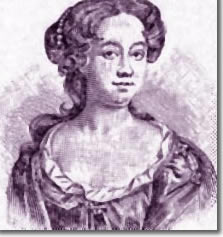Aphra Behn was the first Englishwoman to earn her living by writing. Born in Kent in 1640, she travelled as a child to the British colony of Surinam in South America (Dutch Guiana). She returned to England and married a merchant named Behn in 1658, who d ied within two years. Famous for her wit and ability, King Charles II employed her as a spy in the Netherlands but she was not well paid and later was imprisoned for debt. Behn turned to writing to make an income and had a successful career as a playwright, novelist and poet of an enormous and diverse output. She was socially popular (a friend of John Dryden) and relatively liberated, causing her to be the object of scandal and her work was accused for many centuries of lewdness and plagiarism, most probably because of her gender. She died in 1689 and was buried in Westminster Abbey.
ied within two years. Famous for her wit and ability, King Charles II employed her as a spy in the Netherlands but she was not well paid and later was imprisoned for debt. Behn turned to writing to make an income and had a successful career as a playwright, novelist and poet of an enormous and diverse output. She was socially popular (a friend of John Dryden) and relatively liberated, causing her to be the object of scandal and her work was accused for many centuries of lewdness and plagiarism, most probably because of her gender. She died in 1689 and was buried in Westminster Abbey.
Behn’s first play of 15 was The Forc'd Marriage (1671). Her most famous was a lively and clever comedy in two parts called The Rover (1677 and 1681) about the adventures in Naples and Madrid of a band of exiled English cavaliers lead by a libertine hero. Her other dramas include The City Heiress (1682), a satire of London life, and The Lucky Chance (1686) about the consequences of arranged and incompatible marriages (a favourite theme of Behn’s.) However, today her novels are more celebrated, especially Oroonoko, or the History of the Royal Slave (1688, reprinted 1933). This is a philosophical novel based on Behn’s travels in Surinam and concerns an enslaved African prince. The African hero’s dignity and distinction is admired, in contrast to Christian hypocrisy and the wickedness of the slave trade. Oroonoko is a contradictory work, displaying a resistance to simplistic racial divides, whilst perpetuating the myths it appears to reject.